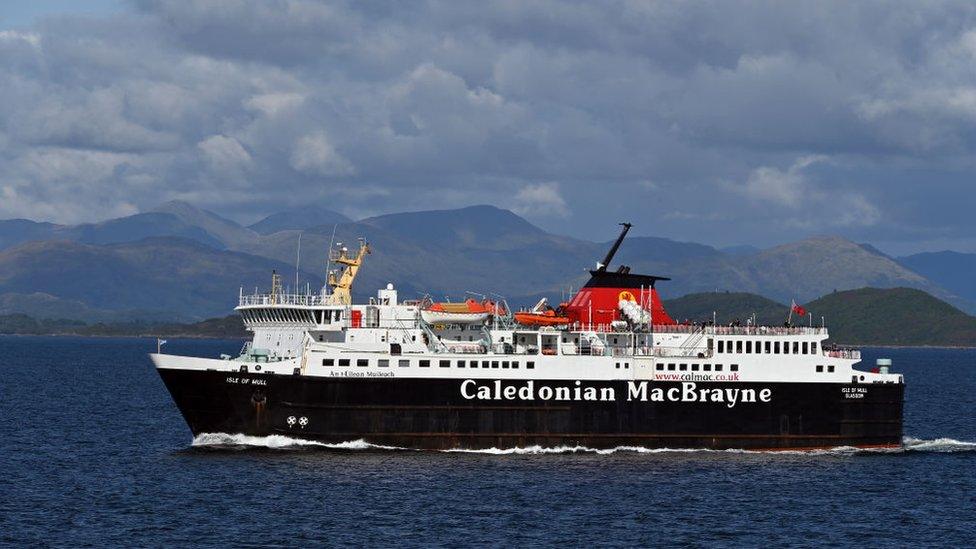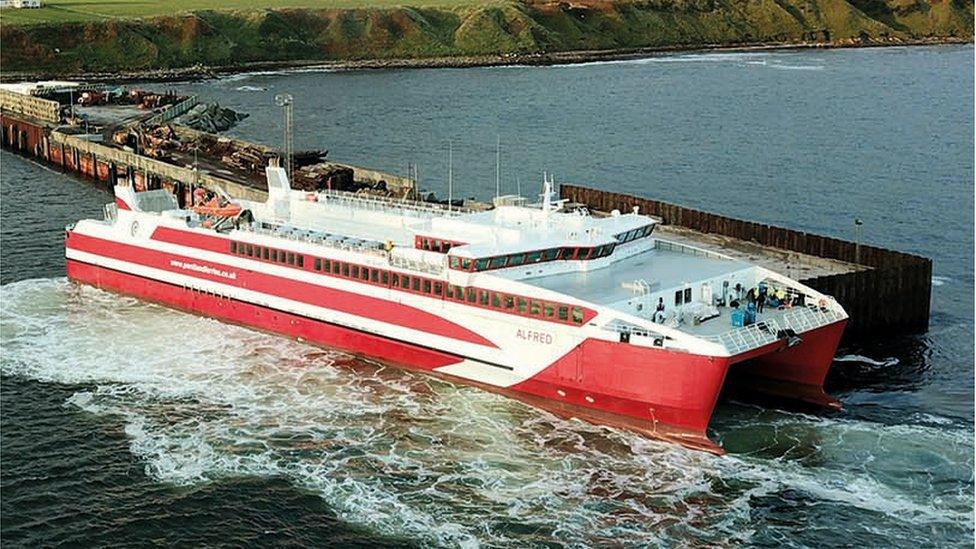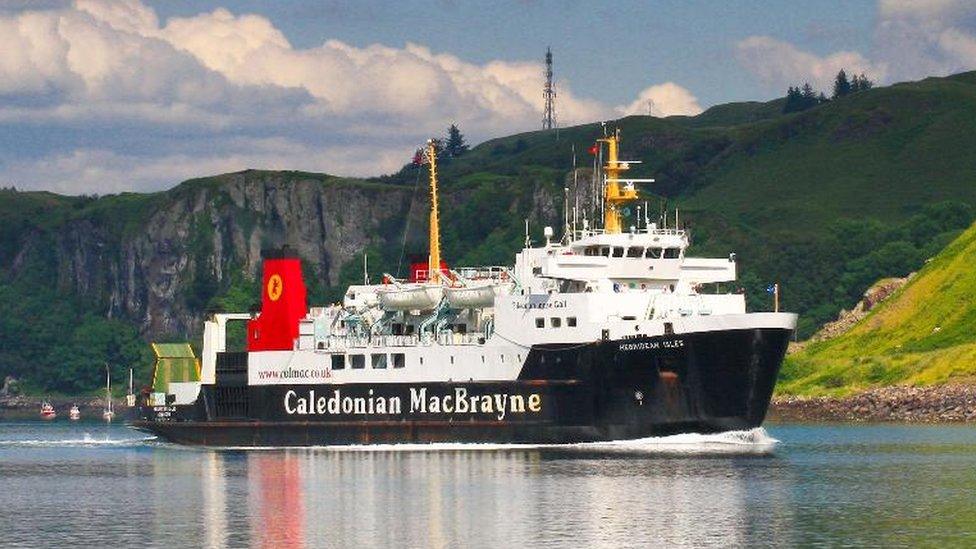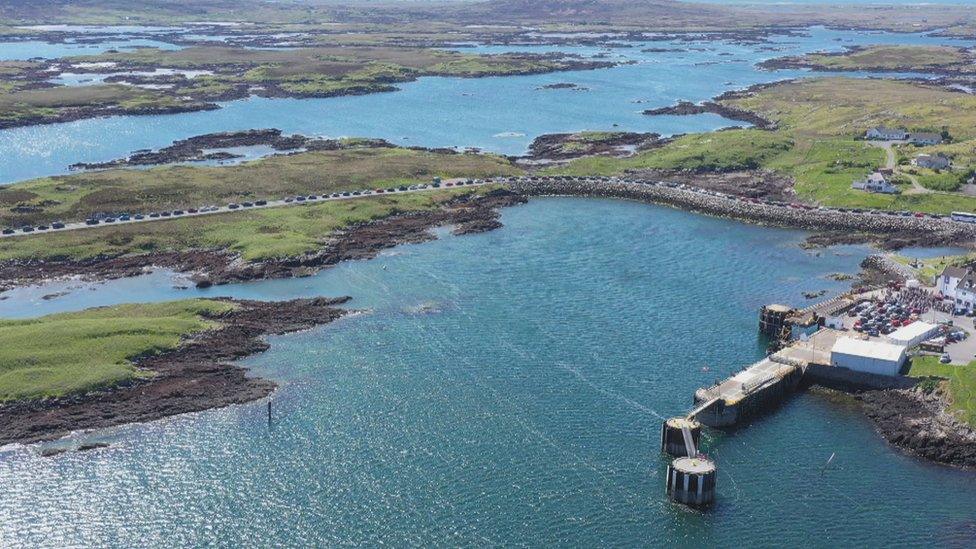CalMac could win ferries contract without tender
- Published

The state-owned ferry company has experienced problems with an ageing fleet and delays to new boats
The contract for Clyde and Hebrides ferry services could be awarded to current operators CalMac without a competitive tendering process.
The Scottish government is to explore exempting the services from tender, saying CalMac would need to ensure improvements across the network.
A due diligence process has been launched to look at the award from financial, operational and legal perspectives.
A decision will be taken next summer.
Announcing the plan at Holyrood, Transport Minister Fiona Hyslop said she was "acutely aware of the vital importance of these lifeline services for our island communities" adding that a direct award would shift the emphasis away from the commercial towards treating ferries as a public service.
"This would help drive service improvements, deliver better communications with communities and introduce meaningful performance indicators that better reflect the experience of passengers using the services," she said.
"I want to be very clear that this will not be an extension of the status quo. I expect a direct award to be a catalyst for positive change on the Clyde and Hebrides network, based on a more efficient, flexible model in the delivery of this important public service," she added.
The move comes after a long period of problems for the CalMac ferry network.
This year has seen spells of significant disruption, including the cancellation of services to South Uist for almost the whole of June. Islanders on Mull have also complained of frequent disruption.
Adding to CalMac's challenges have been delays to the completion of two new ferries which are now running six years behind schedule and three times over budget.
Ferries system 'not working'
Scottish Conservative transport spokesman Graham Simpson MSP said: "Islanders hoping for some clarity on how ferries will be run, by whom and for how long will be bewildered by this statement.
"Scotland's ferries system is not working. Our ageing ferries are unreliable. The procurement and confused governance system is not fit for purpose.
"The minister says the status quo is not an option. I agree. But it is difficult to see how what was announced today is anything but the status quo. Far from announcing a new model which would give hope to islanders, the minister has kicked the can down the road," he said.
The general secretary of the Rail, Maritime and Transport (RMT) union welcomed the news.
Mick Lynch said: "A long term direct award would bring much-needed stability and certainty to workers and passengers on CalMac operated routes and protect public investment.
"We will be meeting the transport minister... to argue that the next step should be a coherent and sustainable ferry plan underpinned by a permanently publicly owned people's CalMac, which has the confidence of ferry passengers, workers and communities alike."
The TSSA union also welcomed the news. Its general secretary Maryam Eslamdoust said a direct award would be good news for their members and for island communities.
"Many of the problems we have seen in recent years, especially over the resilience and replacement of CalMac's ageing fleet, have been a direct result of the contracting model that currently exists.
"Short term funding causes short-term thinking that leads to ageing and broken-down ferries. We need longer-term more stable funding and better investment in the service," she said.
Robbie Drummond, chief executive of CalMac, said:
"With under a year remaining on the current contract, we welcome the opportunity to work alongside the Scottish government and Transport Scotland to ensure continuity of lifeline ferry services and a focus on continual improvement for communities across the Clyde and Hebrides.
"Taking the uncertainty out of the contract would allow us to focus all our efforts on improving service delivery, without the distraction of a highly resource-intensive procurement process."


Some will see this move as a reward for failure.
CalMac has struggled to deliver. Many in our island communities have paid a price for that.
So why does CalMac look set to remain in charge of this key public service?
In usual times, the multi-million pound contract would be put out to tender. That way, rivals could bid to run the service.
The contract's due to expire next September, so a deadline was looming. But these are far from usual times.
CalMac's fleet is ageing and prone to breakdown. Some of its ferries are beyond retirement age and delivery of new vessels has been stalled for years.
The MV Glen Sannox is the most famous - or infamous - ferry in Scotland, and it's six years late. Proof, say critics, the ferry system is bust.
There's talk of root-and-branch reform of the bodies which run Scotland's ferries to ensure CalMac, Transport Scotland and the ferries procurement agency CMAL are no longer at loggerheads. But that's yet to happen.
With so much up in the air, why make matters worse with a drawn-out tendering process? We've learned that's the view of the Scottish government.
It wants a direct award of the contract to CalMac.
That way, ministers believe, the service for islanders will improve while new ferries join the fleet and the creaking system is reformed.
But some fear it means more of the same - and the crisis continuing.
Related topics
- Published6 November 2023

- Published23 October 2023

- Published4 June 2023
